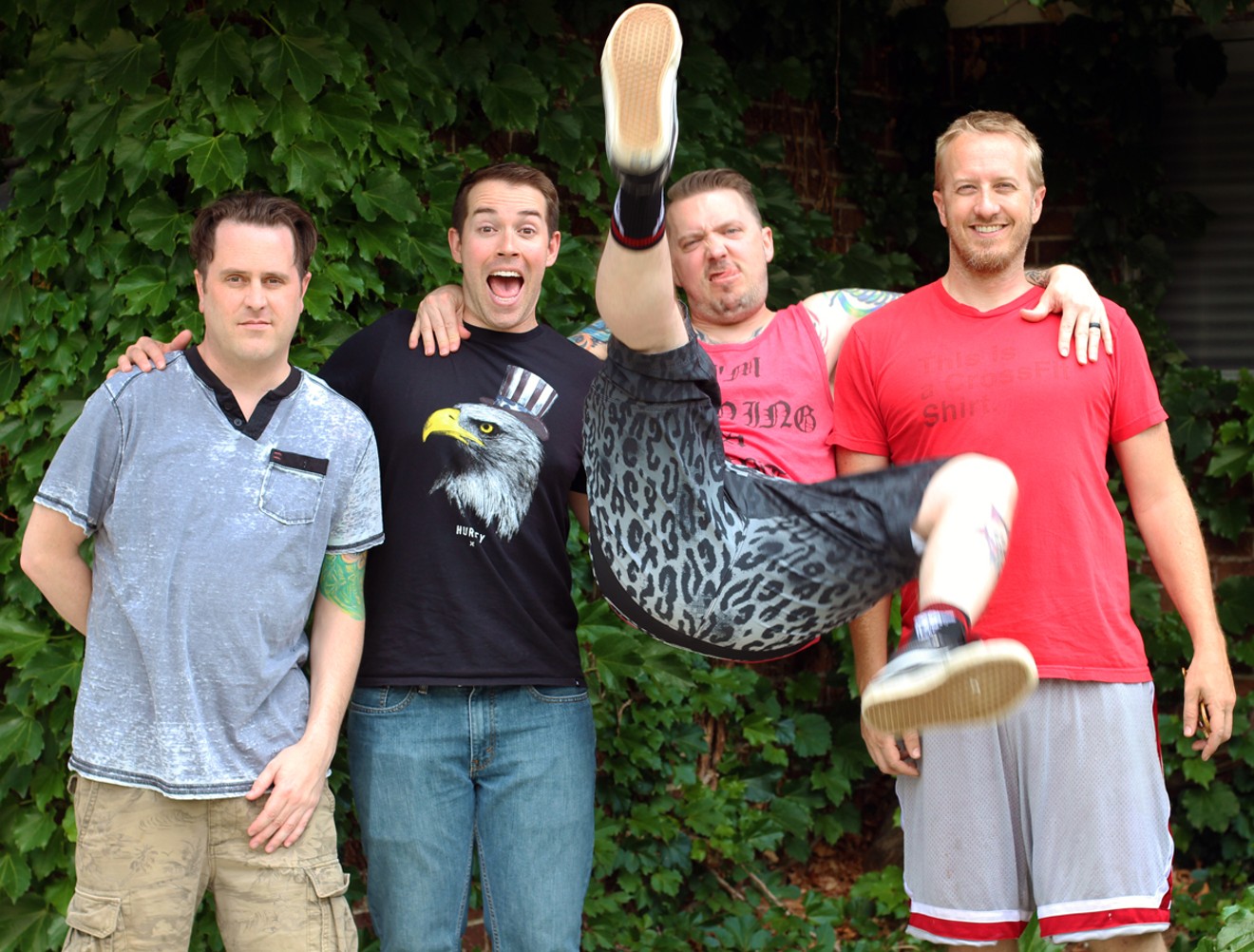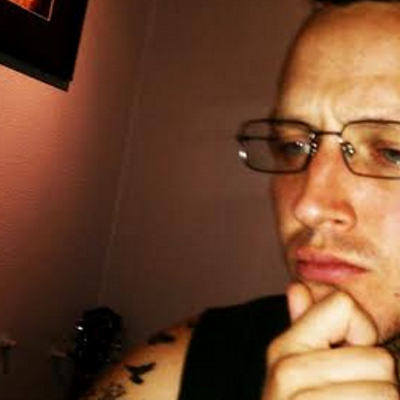“I don’t think my eyes really opened up until the first time I got shot at,” says Tim Burdick, Denver pop-punk singer turned Army infantry man.
Dodging bullets was the last thing on Burdick’s mind when he was a high school musician in the late ’90s, playing in the pop-punk band Suburbia’s Finest.
But when terrorists attacked the United States on September 11, 2001, he stepped down as frontman for the group and joined the Army, where he served three tours in Iraq, shaking up his vision of the world and dashing his musical aspiration for years.
In Iraq, fighting dulled Burdick’s enjoyment of life, subdued his laughter and strained his friendships. Demons followed him home after he left the Middle East. But these days, thanks to music, things are looking up for him.
“Tim is not the same guy that he was two years ago,” when he returned to the United States, drummer Cody Hull says. “His level of enthusiasm and his sense of humor are back.”
So is Suburbia’s Finest. In May, nearly twenty years after the release of its first record, the group dropped a new album, Heart and Soulless. The project was sixteen years in the making.
Burdick formed the band with childhood friends Chad Breznay, Jason Irving, Tomas Brown and Everett Wolfe when they were high-schoolers in Littleton; Hull joined later.
“I started writing lyrics when I was about fifteen and thought, ‘This would be cool with music behind it,’” he remembers. “They were just the musings of a teenager.”
The bandmates arranged a concert in a park with Petrol Apathy. That group’s manager, Dan Steinberg, a force in the Denver music scene, reached out to Suburbia’s Finest.
“He said something like, ‘It’s good business to offer a show back to someone who gives you a show,’ so he offered us the Blue Meanies and the Nobodies at the Snake Pit,” Burdick says. “It was cool. I had an Asian Man/Kung Fu records comp that had the Blue Meanies on it. It was the first time I got to play with a band that I listened to.”
Steinberg mentored the young musicians, helping them secure high-profile opening slots with groups like Alkaline Trio, AFI and Fenix TX. But Irving complained that Steinberg undervalued the band, and he called him and argued about money. After the fight, Steinberg told Burdick that he would no longer help out the act.
“I never talked to Dan about money,” Burdick says. “I didn’t give a shit back then. He always did pay us, but not as much Jason thought we were worth. Dan was always cool about money and rarely asked for a percentage. He was about as pro bono as you could possibly be. He did a lot for us.”
After the dispute, Suburbia’s Finest cut ties with Irving and replaced him with Chris Shellenberg. Without Steinberg, opening slots dried up. Still, the band found new audiences.
“We were a pop-punk band playing frat parties in the early 2000s,” recalls Hull. “It was so Van Wilder that it hurts. For the time and place, though, it was perfect, and so much fun.”
The group began recording in 2001 and had finished a handful of tracks before the September 11 attacks.
“I was deeply affected by it,” says Burdick. “I was raised in a family where the Fourth of July was a big
thing and national pride was huge. We would stand up when the national anthem was on TV. My head was telling me I wasn’t supposed to be a musician; I was supposed to be a soldier.”
After a Halloween show, Burdick told his bandmates he had enlisted and would start basic training in 2002. The band and the album were put on indefinite hold.
“The first day or two of basic, I felt like I had made a colossal mistake,” Burdick says. “I didn’t realize how easy of a life I’d had before then. I don’t think I understood anything about real life until I got there. I got in good shape really quickly, though, and after basic, I felt really good about who I was. Basic training was not nearly as hard as what I was about to experience.”
He was stationed in Germany. His first deployment from there to Iraq lasted thirteen months; his second took fifteen. During the war, he took solace in music whenever he and his fellow soldiers could find a CD player.
Not long after five of his friends had been killed in combat, he found a copy of Rolling Stone magazine. There was a full-page ad for a “Rock Against Bush” compilation that included some of his favorite punk bands.
“I took it as a personal jab against me and the other guys I was serving with,” Burdick says. “It was really shitty to see. I was just like, ‘Fuck these pretentious pricks,’ and after that, I stopped listening to music for a long time.”
Burdick, who served with Medal of Honor recipient Ross McGinnis, has little to say about combat. “It was not a cozy, comfortable tour,” he adds. The joints and cartilage in his knees were damaged. Just shy of his tenth year in the Army, he was honorably discharged and sent home to Fountain.
“When I got out, I was very depressed,” he says. “I wanted to stay in the military for as long as possible. I found some therapy and outreach groups, and I knew I had to do something, but I didn’t know what I wanted to do.”
Hull, who’d remained active in Denver’s music scene, saw on social media that Burdick was struggling, often clashing with his friends.
Videos of people doing 22 push-ups for veteran suicide awareness persuaded Hull to contact Burdick: “I thought, ‘Fuck this, I’m calling him.’”
Hull asked Burdick if he could still sing. Burdick said yes. The two started discussing finishing the last Suburbia’s Finest album.
For Burdick, Hull’s phone call came at the perfect time. “I was just stagnant and incredibly depressed,” he says. “I had no reason not to go meet Cody. I probably would be a veteran statistic if I didn’t go meet him.”
Hull wasn’t sure if a collaboration would be possible.
“I wanted to make sure that our relationship was reconcilable and to see if he really wanted to do this,” he says. “We both had our guard up.”
Ultimately, they decided to play music together again. Hull contacted former guitarist Shellenberg and recruited his old friend Jon Sisk to play bass.
With the new lineup complete, the musicians scheduled their first practice. It went poorly. The practice room was small, and the windows were covered. Burdick froze. He had no idea how to escape from the room.
“I told him I had an AR-15 in the closet behind my drums and talked about the exit strategy,” Hull says. “That took the weight out of the room and calmed him down.”
As the months went by, Burdick relaxed and the group bonded. In April of last year, Suburbia’s Finest played its first show in fourteen years, opening for Fenix TX and Unwritten Law at the Black Sheep in Colorado Springs.
“I puked before that show — I was really nervous,” Burdick says. “I never used to get nervous, even when I led soldiers in combat. [But] it ended up being one of the most fun experiences of my life. It’s better than it was before.”
In May, the band finally released Heart and Soulless, sixteen years after the album was started. It’s pop-punk perfection, a nod to the genre’s past. Every song but the title track was written before Burdick enlisted. His gut-wrenching lyrics, a byproduct of teen angst, take on new meaning now, after his experiences in Iraq.
Burdick doesn’t worry about whether the album receives critical acclaim. Just playing music with Suburbia’s Finest is enough for him; it’s a way of honoring those he served with who never returned home.
“I saw a lot of young people die way before their time,” he says. “I kind of feel like I owe it to them to live my dream, because theirs is over.”
[
{
"name": "Air - MediumRectangle - Inline Content - Mobile Display Size",
"component": "12017618",
"insertPoint": "2",
"requiredCountToDisplay": "2"
},{
"name": "Editor Picks",
"component": "17242653",
"insertPoint": "4",
"requiredCountToDisplay": "1"
},{
"name": "Inline Links",
"component": "18838239",
"insertPoint": "8th",
"startingPoint": 8,
"requiredCountToDisplay": "7",
"maxInsertions": 25
},{
"name": "Air - MediumRectangle - Combo - Inline Content",
"component": "17261320",
"insertPoint": "8th",
"startingPoint": 8,
"requiredCountToDisplay": "7",
"maxInsertions": 25
},{
"name": "Inline Links",
"component": "18838239",
"insertPoint": "8th",
"startingPoint": 12,
"requiredCountToDisplay": "11",
"maxInsertions": 25
},{
"name": "Air - Leaderboard Tower - Combo - Inline Content",
"component": "17261321",
"insertPoint": "8th",
"startingPoint": 12,
"requiredCountToDisplay": "11",
"maxInsertions": 25
}
]












